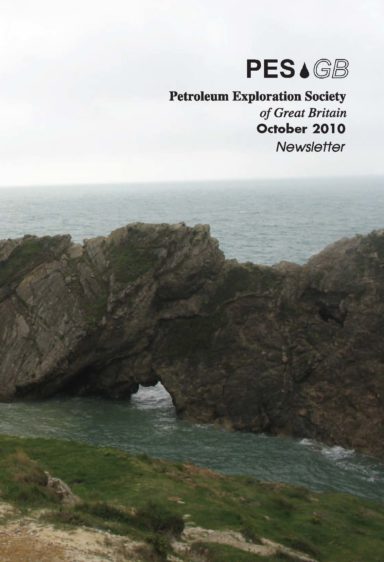PESGB October 2010
- Book Review
- Boulby Mine Field Trip Review
- Caribbean/Central America
- Data Management Conference Review
- PESGB Young Professionals
Plus much more inside
President’s Page- Henry Allen
The Gulf of Mexico disaster has been truly awful in so many different ways. Its impact on the natural environment is obvious, it has affected the livelihoods of so many who live and work around the coast, it is impacting on deep water oil & gas operations in the region and potentially elsewhere, it has knocked for six one of the largest and most respected global companies, and it has hit our pension funds. But most hurtful of all is the tragic loss of lives of crew from a proud rig with a good safety record. This left grieving colleagues with one of the most monumental technological challenges yet faced, working 20 hour days non-stop to derive and build solutions to tame the beast unleashed on the seabed 5000ft below the surface, and ultimately seal it.
All this in the face of huge and voracious public hostility. I don’t remember this happening when Piper Alpha blew, killing 167 people and spewing oil into the sea. Everyone then seemed to rally round Occidental to deal with the aftermath; the industry, the public and politicians alike. The inquiries, the lesson-learning and the soul-searching followed later with reasonable dignity. Nowadays in this litigation-fearing culture we seem not to be allowed to admit that errors have been made. Surely we need to be able to openly face our mistakes and learn from them? We will never know how many lives may have been saved in the North Sea because of what we learned from the awful experience of Piper Alpha.
At the operational level I believe BP have done a fantastic job in responding to this crisis. I watched in as much detail as I could by logging on to the BP website and in particular taking in
the technical briefings by Kent Wells. He delivered them with great clarity and openness while at the same time being sensitive to the stress imposed on the technical teams and clearly appreciative of their efforts. Surprisingly, the higher leadership of the Company seem to have had lessons to learn about how to behave in times of extreme adversity, but it is clear to me that the technical teams have achieved great things. It is a shining example of how groups from BP, various service companies, and even some of its competitors have all worked together on a complex
and difficult project which started suddenly from scratch, and with unimaginable consequences of failure. I can only guess that in the years to come we will hear great human stories about how
this has all been achieved. There has been much talk of economic and environmental cost but it must have also taken a serious personal toll on many people striving to put matters right in diabolical circumstances.
The incident has been used to highlight how, through our dependency on a finite hydrocarbon resource, we are continually pushing into new frontiers of both geography and technology. Some
say we should simply not be doing it but how realistic is that? Depend on the Middle East more and more and deplete it even faster? Burn more and more coal and tar sand and create increased
risk of climate change feedback? Force a faster switch to renewables and more energy conservation by inducing a major global power shortage? The choices are not good.
The reality is that this trauma should bring long term benefits for deep water drilling, increasing its safety and viability. It has shown that there will be ways of dealing much more quickly with
such an emergency. We can learn the lessons, take more precautions, reduce the risk of similar incidents, but still be prepared for the ultimate disaster. Now is not the time to lose our bottle.


